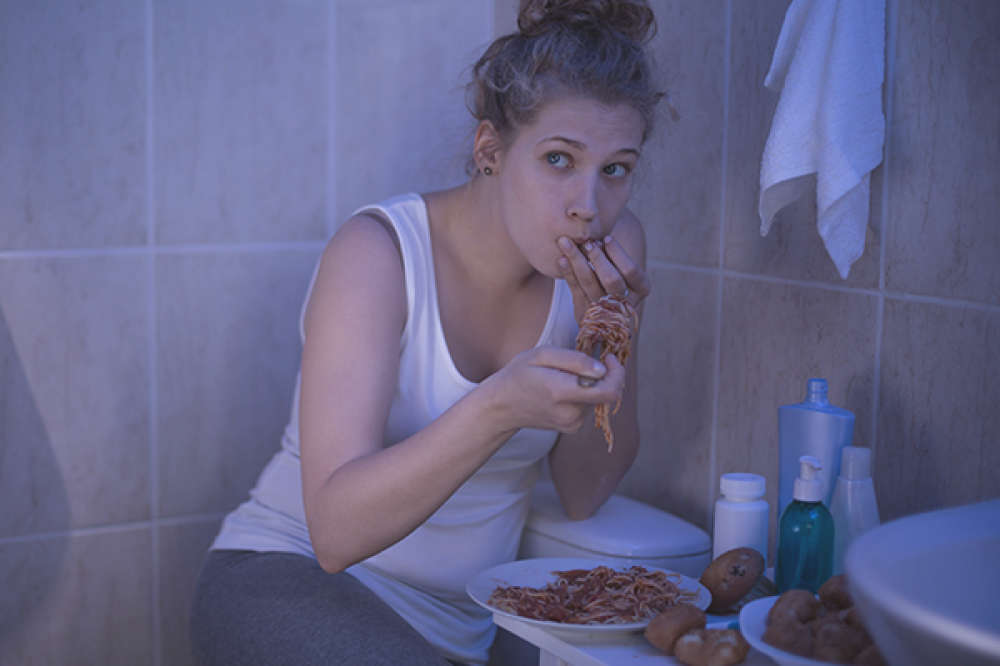Bob is afraid that people find him unattractive. When he goes out, he is nervous that others are judging his appearance and his body. Because of this fear, when others look at him or take his picture, Bob believes that they are noticing his flaws, despite there being no evidence of this.
Bob has social appearance anxiety. Social appearance anxiety is a type of social anxiety, specifically about one’s appearance and body shape. Much like individuals with social anxiety, individuals with social appearance anxiety experience a fear of negative evaluation by others. However, unlike social anxiety, social appearance anxiety focuses on the perceived negative evaluation of one’s physical appearance. Additionally, social appearance anxiety is not generally centered around a single physical aspect, such as one’s nose or hair, but rather the societal pressures around general physical appearance.1
Social Appearance Anxiety and Disordered Eating
Previous studies have indicated that social appearance anxiety is associated with greater levels of body dissatisfaction, social anxiety, perfectionism, anorexia nervosa, and bulimia nervosa, indicating that there may be a link between social appearance anxiety and disordered eating.2,3, 4 To explore this further, a new study by researchers at the University of Louisville examined the relations between social appearance anxiety and binge eating behaviors.4
In the study, 300 women completed questionnaires examining their levels of concern over mistakes (a component of perfectionism), social appearance anxiety, dietary restraint, and binge eating at three time points. The results indicated that social appearance anxiety, dietary restraint, and concern over mistakes all individually predicted binge eating behaviors. However, when examined all together, social appearance was the strongest predictor of binge eating behaviors, with concern over mistakes and dietary restraint no longer significantly predicting binge eating behaviors. Additionally, concern over making mistakes had an effect on binge eating behaviors through social appearance anxiety. In other words, concern over making mistakes predicted social appearance anxiety, which in turn predicted binge eating behaviors. In contrast, dietary restraint, or the perceived deprivation of food, did not.
What does this mean?
The study is particularly interesting because one of the core assumptions about binge eating is that dietary restraint leads to an emotional and physiological response that results in a binge.5 However, the study here indicates that, while dietary restraint does predict binge eating behaviors, it may not be the strongest predictor of binge eating behaviors. Instead, social appearance anxiety may be a stronger predictor of binge eating behaviors. Additionally, the study also indicates that components of perfectionism may lead to social appearance anxiety, which in turn leads to binge eating behaviors.
So should we be focusing on social appearance anxiety when treating binge eating disorder?
Perhaps, though further research is necessary. It should be noted that the study was conducted on a non-clinical sample. Thus, further research on individuals with binge eating disorder is necessary in order to make conclusions about treating BED. Additionally, because the study was only conducted on women and the sample was predominantly Caucasian, it is unknown how these findings relate with other demographic and cultural factors. However, despite these limitations, the results here do point to the possibility of targeting social appearance anxiety over dietary restraint when treating binge eating.
Sources
1. Hart, T. A., Flora, D. B., Palyo, S. A., Fresco, D. M., Holle, C., & Heimberg, R. G. (2008). Development and examination of the social appearance anxiety scale. Assessment, 15, 48-59.
2. Schwalberg, M. D., Barlow, D. H., Alger, S. A., & Howard, L. J. (1992). Comparison of bulimics, obese binge eaters, social phobics, and individuals with panic disorder on comorbidity across DSM-IIIdR anxiety disorders. Journal of Abnormal Psychology, 101, 675-681.
3. Levinson, C. A., Rodebaugh, T. L., White, E. K., Menatti, A. R., Weeks, J. W., Iacovino, J. M., & Warren, C. S. (2013). Social appearance anxiety, perfectionism, and fear of negative evaluation. Distinct or shared risk factors for social anxiety and eating disorders? Appetite, 67¸125-133.
4. Brosof, L. C. & Levinson, C. A. (2017). Social appearance anxiety and dietary restraint as mediators between perfectionism and binge eating: A six month three wave longitudinal study. Appetite, 108, 335-342.
5. Polivy, J., & Herman, C. P. (1985). Dieting and binging: A causal analysis. American Psychologist, 40, 193.
Carol S. Lee is a clinical psychology doctoral student at University of Massachusetts Boston. She received her Bachelor of Arts in psychology from University of California San Diego in 2012 and her master’s in clinical psychology from UMass Boston in 2015. Carol works with Dr. Sarah A.
Hayes-Skelton to examine how and why therapeutic exposures and behavioral experiments in treatments for anxiety disorders work. In an effort to examine one piece of this, Carol’s current research draws from both social and clinical psychology to examine the process behind engaging in a behavior despite any fear or anxiety associated with that behavior. Carol and Dr. Hayes-Skelton collaborate to write articles for Anxiety.org.



